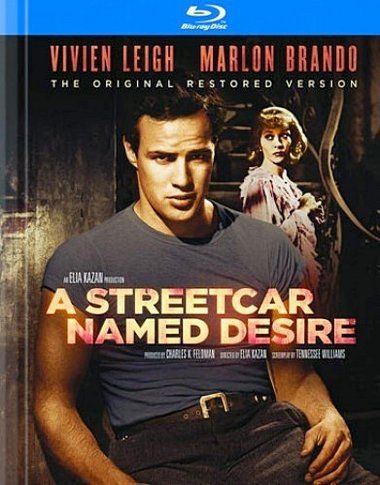Sometimes a performance overwhelms a movie. On paper, Stanley Kowaski is an important role in A Streetcar Named Desire - of that there’s no doubt - but the showcase role should be Blanche DuBois. Blanche is a fragile woman who’s come to New Orleans after leaving her home city under dubious circumstances. And nothing against Vivien Leigh’s work in the film, but it’s Marlon Brando as Stanley who owns the movie. Brando was ready to pop when the film was released in 1951 – he’d done a film before, but when partnered with director Elia Kazan his method acting changed the way films were made. Seriously. Our review of the Blu-ray of A Streetcar Named Desire follows after the jump.
Blanche (Leigh) shows up at her sister Stella’s with all her possession in tow. No one’s home, so she finds Stella (Kim Hunter) with her husband Stanley at the bowling alley. They talk and bicker like sisters. Blanche points out she had to watch the family die, while – when home – Stanley wonders what happened to the family money. Blanche is there for an undetermined amount of time, and the cramped quarters point out how much she’s a burden.
Blanche is disapproving of Stanley in total as he’s a working class guy and a second generation American. But what Stella can’t completely articulate is the raw animal desire that fuels her husband. He may be primitive, but he’s lusty and manly in all the right ways. Blanche sees herself as proper, prim, and starts going out with Stanley’s friend Mitch (Karl Malden), but she sees herself as a good girl and won’t do much more than kiss. She also only goes out at night in darkly lit areas. Tensions escalate – as they must – when Blanche won’t leave and Stanley learns some secrets about her houseguest. Blanche is fragile, and everyone is hoping things work out with her and Mitch, but the truth must come out.
Based on the Tennessee Williams play, this was – in some ways – meant to be Leigh’s chance to do something both similar and different than her turn as Scarlet O’Hara, a role that she would be linked to for the rest of her life. And though Leigh is a great actor, Brando’s performance - his mumbly delivery and intense good looks - take the film over. He leaves the film for some sections while working, but his performance is the sort that you miss him when he’s off screen. Though he had a forbearer in Montgomery Clift, Brando was working with a director who completely understands his method, and you can see how American film acting was changed irrevocably by this work. It used to be that all casting directors would say that every male wanted to be Brando. Here’s why. He had spent two years playing it on stage, and this is one of those great moments of such a performance being captured.
In some ways Brando works against the film - which is still effective - and he helps plays down some of the film’s camp by keeping Blanche from complete focus. The Southern spinster as a type has a drag queen quality, but Leigh’s performance never reads that way, perhaps because her eccentricities never take over the narrative. But though Blanche is the lead, Brando is the star. It happens.
Warner Brother’s Blu-ray presents the film in full frame (1.33:1) and in 2.0 DTS-HD Master Audio Mono. This looks to be a well mastered version of the older restoration – I wouldn’t say it was done 4K, but it looks solid and the black and white photography may not have the inky blacks of some older movies, but the transfer looks to respect the original material. The film comes in book form, which means there’s a 42-page booklet that accompanies the film. Most of the supplements are recycled from the previous DVD special edition, which means the commentary with the late Karl Malden is included, and he’s joined by historian Rudy Belmer and Jeff Young.
The big prize of the extras is ‘Elia Kazan: A Director’s Journey’ (76 min.) with narration by Eli Wallach. Though Kazan’s reputation may be tarnished by his testimony to the House Committee on Un-American Activities, the work is the work, and this documentary covers all of his high points, of which he had many. ‘A Streetcar on Broadway’ (22 min.) gets Kazan and Malden, Behlmer, Richard Schickel, and Kim Hunter to talk about the origin of the play, and a lot of talk about Brando and the original production – which had Jessica Tandy in the Blanche role. ‘Desire and Censorship’ (16 min.) talks about getting the film made at the time, and how they would elide some of the less savory elements of the film and the restoration, which shows how the scenes were altered for the original version. ‘North and the Music of the South’ (9 min.) gives composer Alex North his due for the score, while ‘An Actor Named Brando’ (9 min.) speaks to the lead. It’s worth checking out for some of the outtakes included, but they show up in their own section (16 min.) along with Brando’s screen test (5 min.) which has Brando doing material from Rebel Without a Cause. There are also audio outtakes (17 min.), and three trailers.


